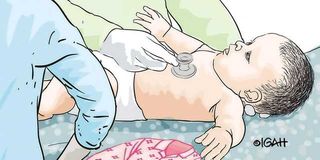Premium
Managing fever in babies

What you need to know:
- For some reason, I had never seen the need to own a home thermometer.
- There was an even more significant, and supposedly common mistake: overdressing him.
One of the things nobody tells you about parenting is that handling fevers are part and parcel of child-rearing. As a new parent, I made many mistakes in this area.
I knew I was in for a long day when the paediatrician asked what his temperature was, and I had no idea. Like most parents, I had used my palm as a thermometer by touching his forehead and using my mind to do a mental calculation of what his temperature could be.
For some reason, I had never seen the need to own a home thermometer, a vital gadget that would help me take accurate temperature readings before deciding on the next course of action.
There was an even more significant, and supposedly common mistake: overdressing him. I saw the baby trembling and subconsciously told myself that he was freezing, therefore, needed something warm, so I threw heavy clothes on him.
The more clothes I added, the heavier the fever seemed to get, which was frustrating.
“Why did you dress him in all these clothes?” the paediatrician inquired.
“He was trembling so viciously,” I replied innocently.
In my inexperience, I had dressed him like an Eskimo at a time he needed to have almost no clothes.
“No don’t do that. You see, when a baby has a fever, the interior is usually boiling and needs to have the vents open so that the heat comes out,” she explained.
I watched as she undressed the trembling boy, pulling off the vests, tops, rompers, and trousers one by one.
“He has to remain in diapers only,” she muttered.
By the time the baby was naked, we had a heap of clothes on the bedside table, like a freshly opened bale.
That is what he needed all along as the human body has a natural cooling mechanism, where the heat inside comes out through skin pores.
Amidst feelings of guilt and naivety, I watched as my son was spread on the cold hospital bed to expose his skin to the cold.
‘A step away from death’
As we let the baby nap and stabilise after being medicated, the paediatrician invited me to her office where she took me through the ins and outs of baby fevers.
The first was to never look down upon baby fever because there is always the never-ending risk of graduating into convulsions, which are a step away from death.
To avoid getting into critical zones in the event the fever starts, and there is no medication around, it is possible to do first aid by sponging the body with warm water.
There is an insistence on lukewarm because its evaporation aids in cooling, while cold water causes shivering which can increase rather than reduce the temperature. According to her, the results of a sponge bath are evident after about 15 minutes.
The other lesson was that although some fevers come and disappear, most are usually symptoms of an underlying viral or bacterial infection.
In other words, even if the fever disappears, a parent should endeavour to have the baby undergo testing by a medic so that the ailment is diagnosed and medication offered.
Before I left, she gave me a pack of tablets called suppositories to take home. Suppositories are little bullet-like pills you shove into a baby’s anus to control fever. They bring the temperatures down in a short period, giving you ample time to get to the hospital with a stable baby.
High fevers are mostly contained with the help of suppositories. It is only in instances where the temperatures remain adamant that medics insert a needle into the vein and administer the medication intravenously.
“These are sold over the counter in chemists. Always have some in the house,” she concluded.
As we drove back home from the hospital that day, it hit me that the most significant wealth a parent can have is good health for the baby, not even money.
A baby’s sickness disorients the parent in ways no bank balance can solve, especially when they cry looking into your eyes for a miracle that you cannot provide.
Hillary has raised his son on his own from the time he was six months.





